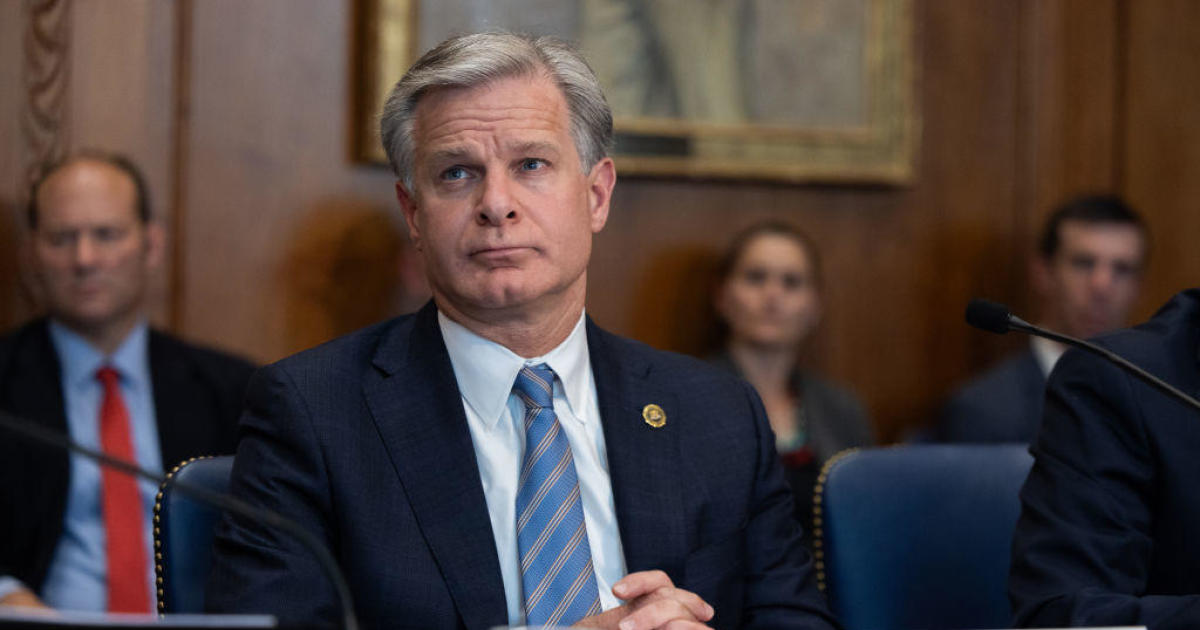FBI Director Christopher Wray announced he will resign from his post at the end of the current administration. He will leave the bureau in advance of President-elect Donald Trump’s inauguration next month.
He made the announcement during a town hall with FBI employees on Wednesday.
“After weeks of careful thought, I’ve decided the right thing for the bureau is for me to serve until the end of the current administration in January and then step down,” he said. “My goal is to keep the focus on our mission — the indispensable work you’re doing on behalf of the American people every day. In my view, this is the best way to avoid dragging the bureau deeper into the fray, while reinforcing the values and principles that are so important to how we do our work.”
“It should go without saying, but I’ll say it anyway — this is not easy for me,” Wray continued. “I love this place, I love our mission, and I love our people — but my focus is, and always has been, on us and doing what’s right for the FBI.”
Trump appointed Wray — a former federal prosecutor and counterterrorism official — as FBI director in 2017 for a 10-year term after firing James Comey, but Wray has since come under fire from Trump and his allies on Capitol Hill over the FBI’s handling of investigations into the president-elect. He has remained director under President Biden, but Trump previously said he intended to remove Wray and replace him with Kash Patel, a former GOP congressional staffer who was tapped by Trump during his first term for roles in the Defense Department and the Office of the Director of National Intelligence.
Wray told the FBI’s rank and file, “We’re not on any one side … We’re on the American people’s side,” and on “the Constitution’s side,” adding, that “no matter what’s happening out there, in here, we’ve got to stay committed to doing our work the right way every time — with rigor and integrity.”
FBI directors are appointed for a 10-year term, which has historically been intended to ensure the position is insulated from political considerations. But presidents have the power to fire and nominate directors at will, and many FBI directors have not served their full terms. The Senate must also vote to confirm any president’s nominee to serve as FBI director.
Wray’s announcement clears the way for Patel to lead the FBI in Trump’s second term. Patel has been meeting in the Capitol with senators who will vote on his confirmation.
Wray and FBI leadership became targets of Trump’s ire in 2022, when FBI agents executed a court-authorized search warrant at his Mar-a-Lago residence in Florida. The search exposed what had been an ongoing federal probe into Trump’s handling of classified records after he left office. The investigation culminated in criminal charges against Trump filed by special counsel Jack Smith, but they have since been dismissed by a federal judge. Trump pleaded not guilty and denied wrongdoing.
If confirmed, Patel would be the third FBI director to work under a Trump administration and take over the nation’s chief federal law enforcement apparatus, amid years of intense criticism from Trump and his allies on Capitol Hill. While Wray’s departure from the job was largely expected, Trump’s announcement that he planned to nominate Patel to the position raised speculation among federal law enforcement about whether Wray would resign or remain in his post ahead of Trump’s inauguration.
Wray took over the post after Trump fired then-Director James Comey, in part because of the FBI’s investigation into the 2016 election that resulted in Robert Mueller’s appointment as special counsel for that case. Comey, who has since become an outspoken critic of the president-elect, found himself at odds with Democrats and Republicans upon his departure from the FBI’s top job.
Since his confirmation in 2017, Wray has spent much of his tenure focusing on internal matters like agent recruitment and national security issues including countering China’s espionage campaigns. He sounded the alarm on foreign efforts to target American infrastructure and warned of aggressive posturing by Iran and Russia.
The FBI employs about 35,000 people — including thousands of field agents — tasked with enforcing federal law and investigating crimes across the country, including terrorism, espionage and child exploitation.
Patel, who could soon be Wray’s replacement, has been outspoken in his criticism of the federal agency and has said he would implement massive reforms and seek retribution for Trump, saying at one point, “We’re going to come after the people in the media who lied about American citizens, who helped Joe Biden rig presidential elections.”
In his remarks, Wray reminded the bureau’s employees that working at the FBI “means conducting investigations without fear or favor … and it means not pursuing investigations when the predication is not there.”
Patel would report directly to the attorney general of the United States — Trump’s current pick for the post is former Florida Attorney General Pam Bondi.
Trump’s announcement that he planned to nominate the 44-year-old Patel to serve as FBI Director was met with criticism from Democratic lawmakers on Capitol Hill and some former officials from Trump’s first term.
John Bolton, who served as national security adviser in Trump’s first term and was Patel’s boss, compared the nomination to Joseph Stalin’s secret police chief.
“Fortunately, the FBI is not” Stalin’s secret police, Bolton said. “The Senate should reject this nomination 100-0,” a reaction that prompted pushback from Trump allies and Vice President-Elect J.D. Vance.
But Republicans on Capitol Hill have appeared open to the pick and argued he could bring change to the FBI.

